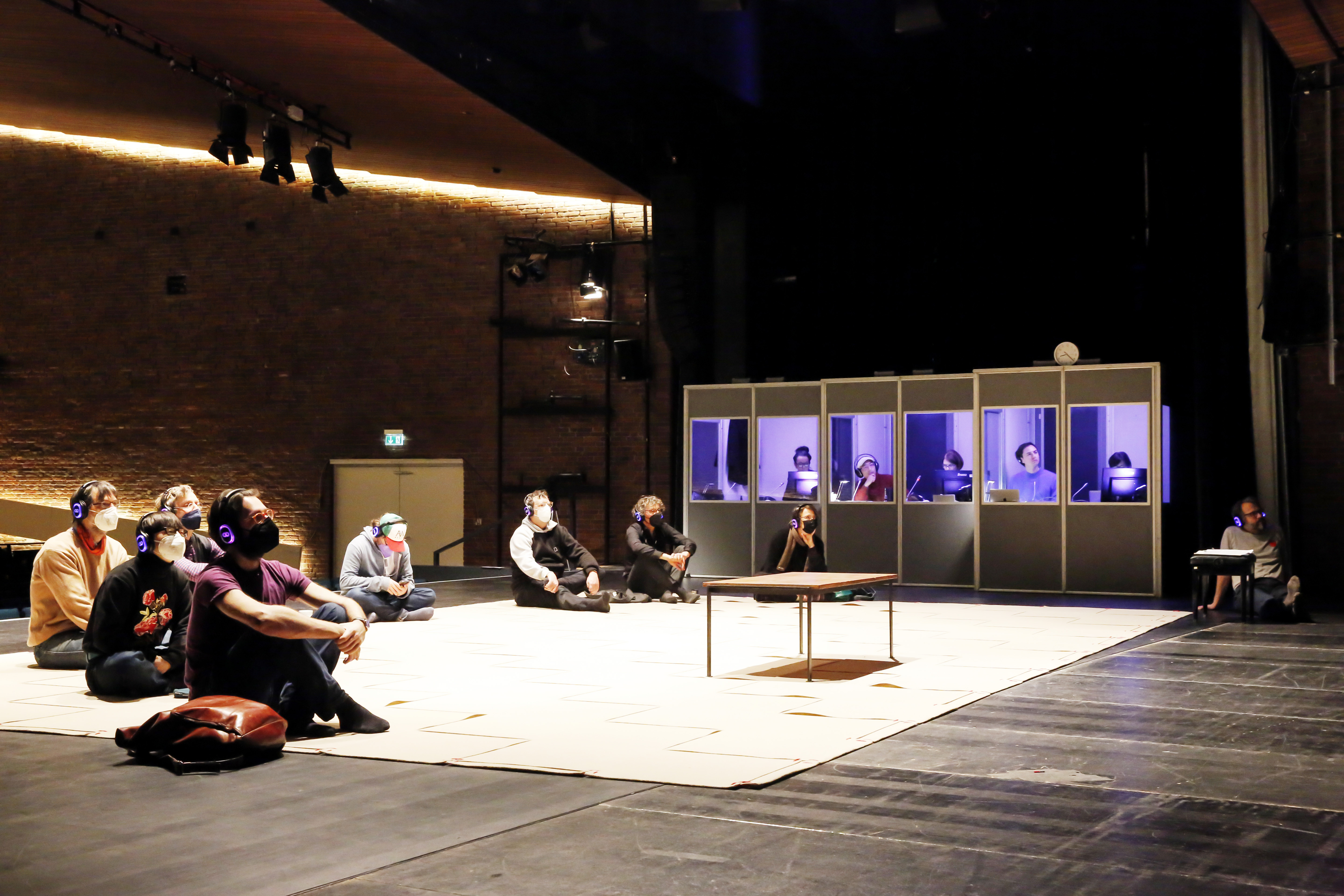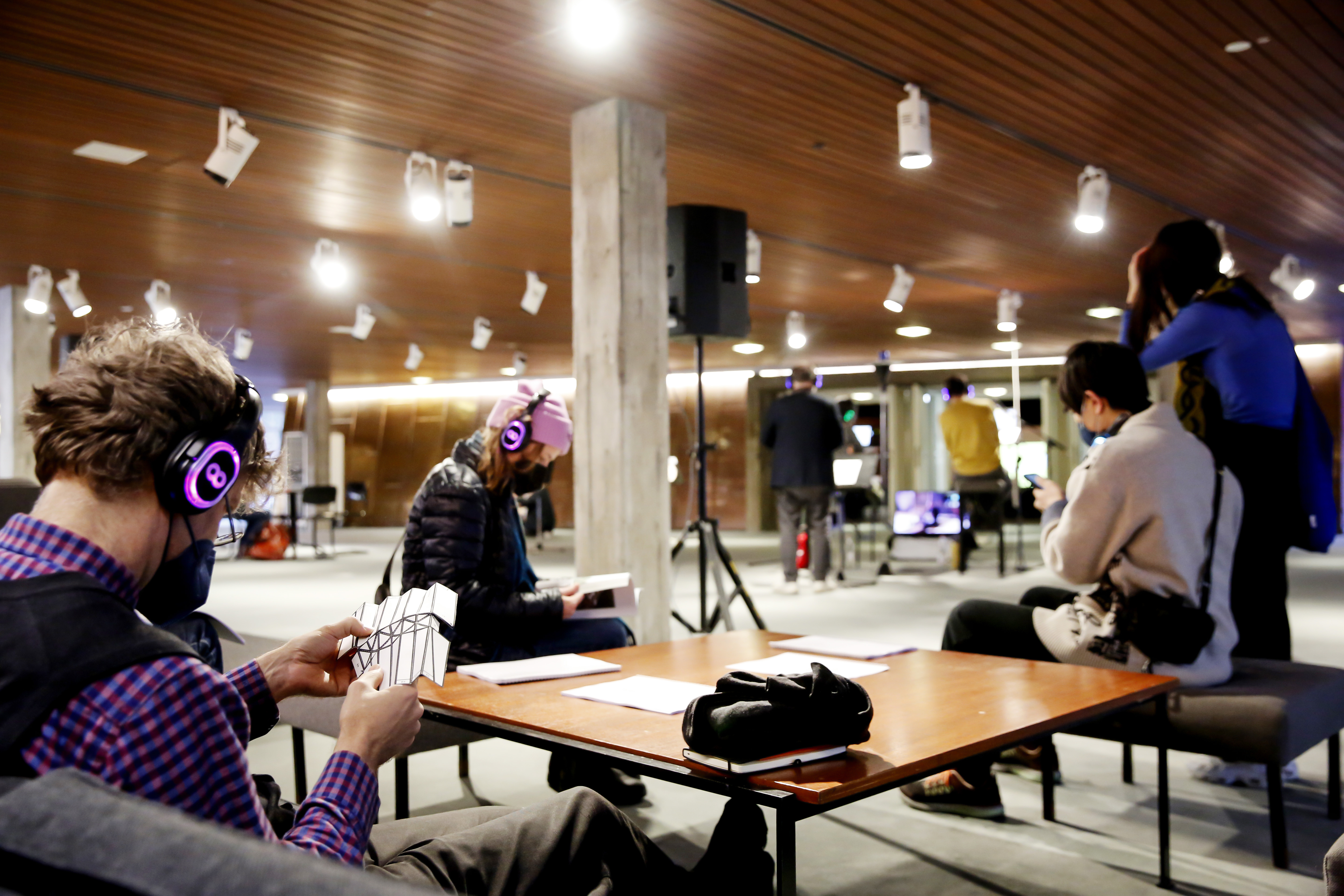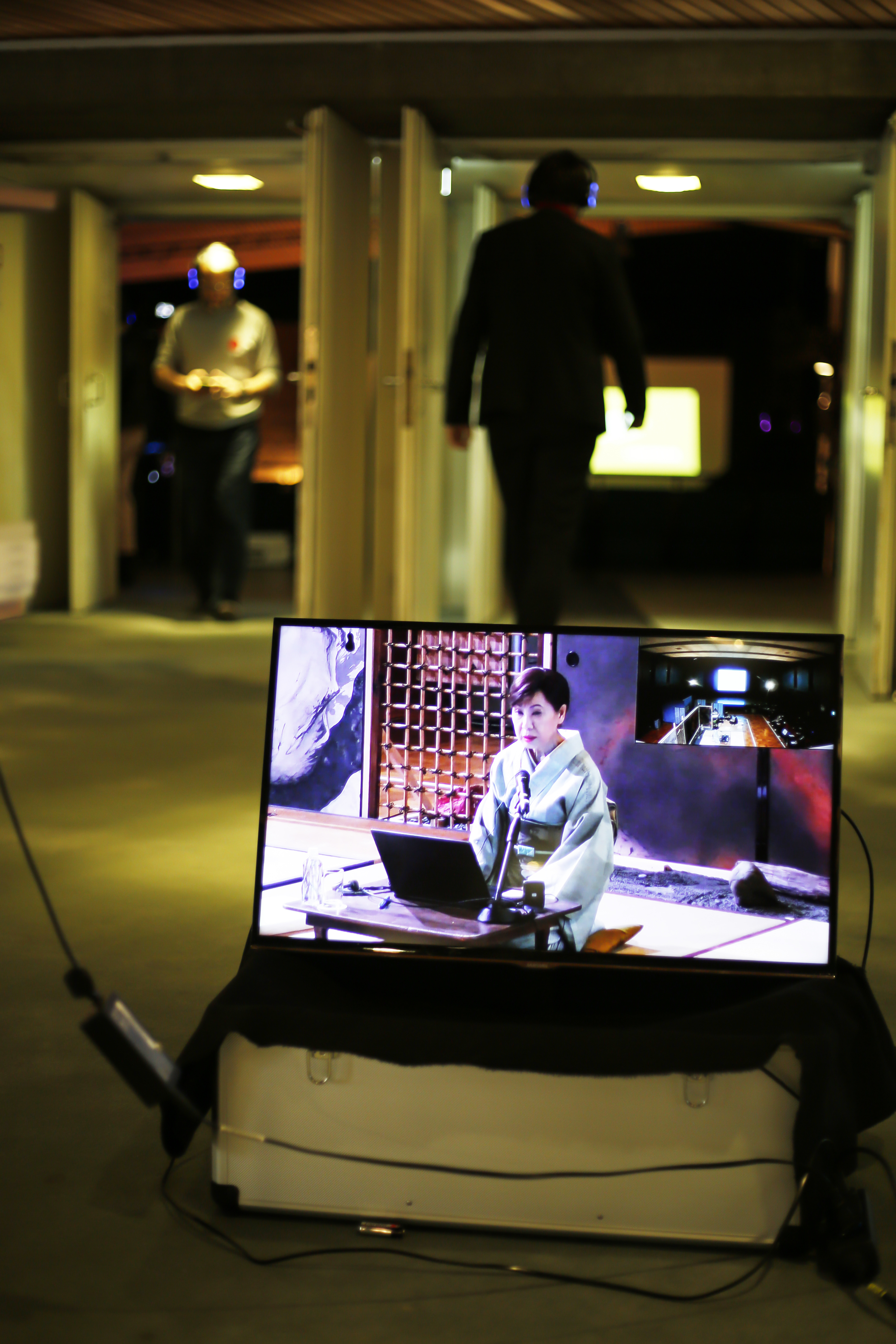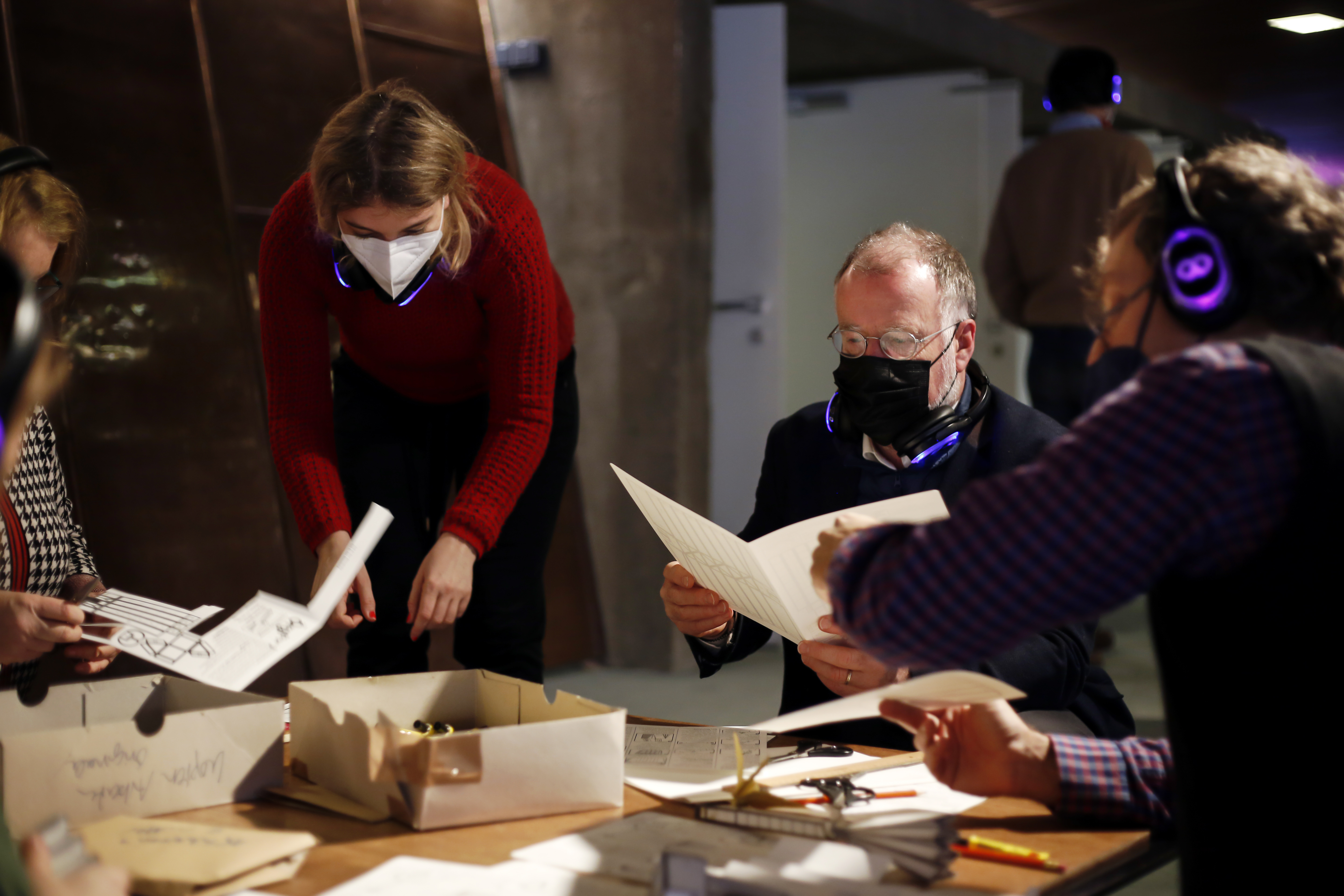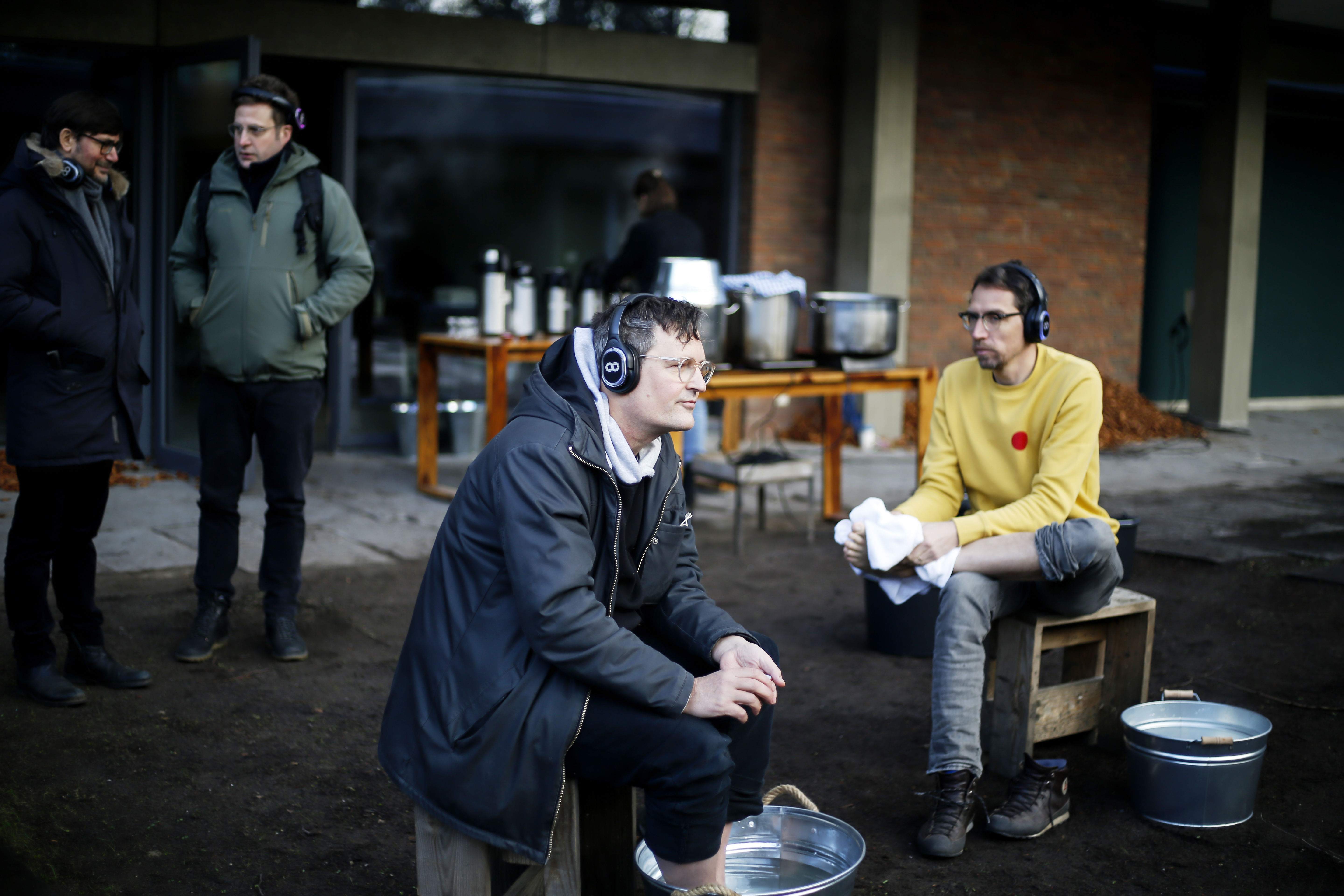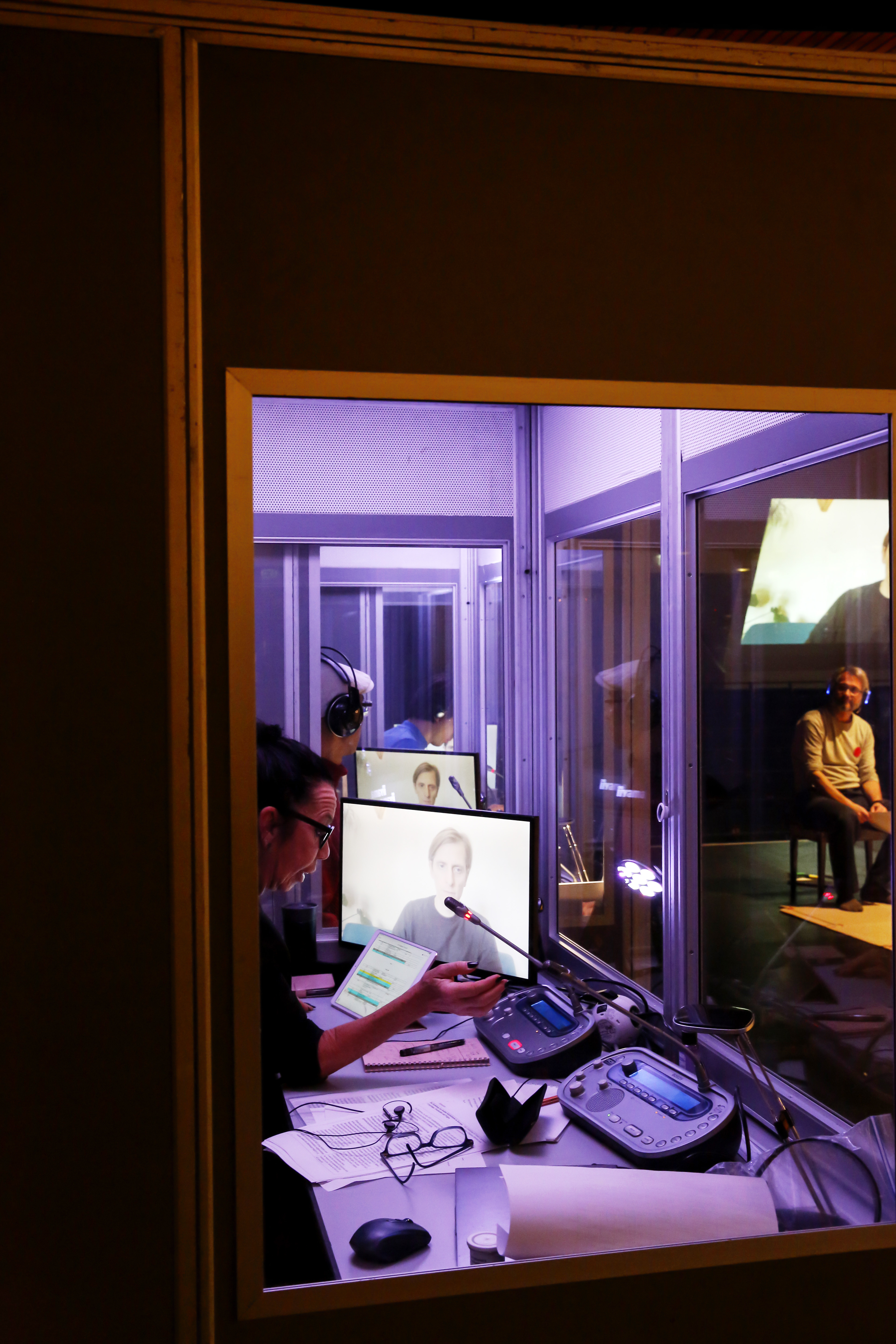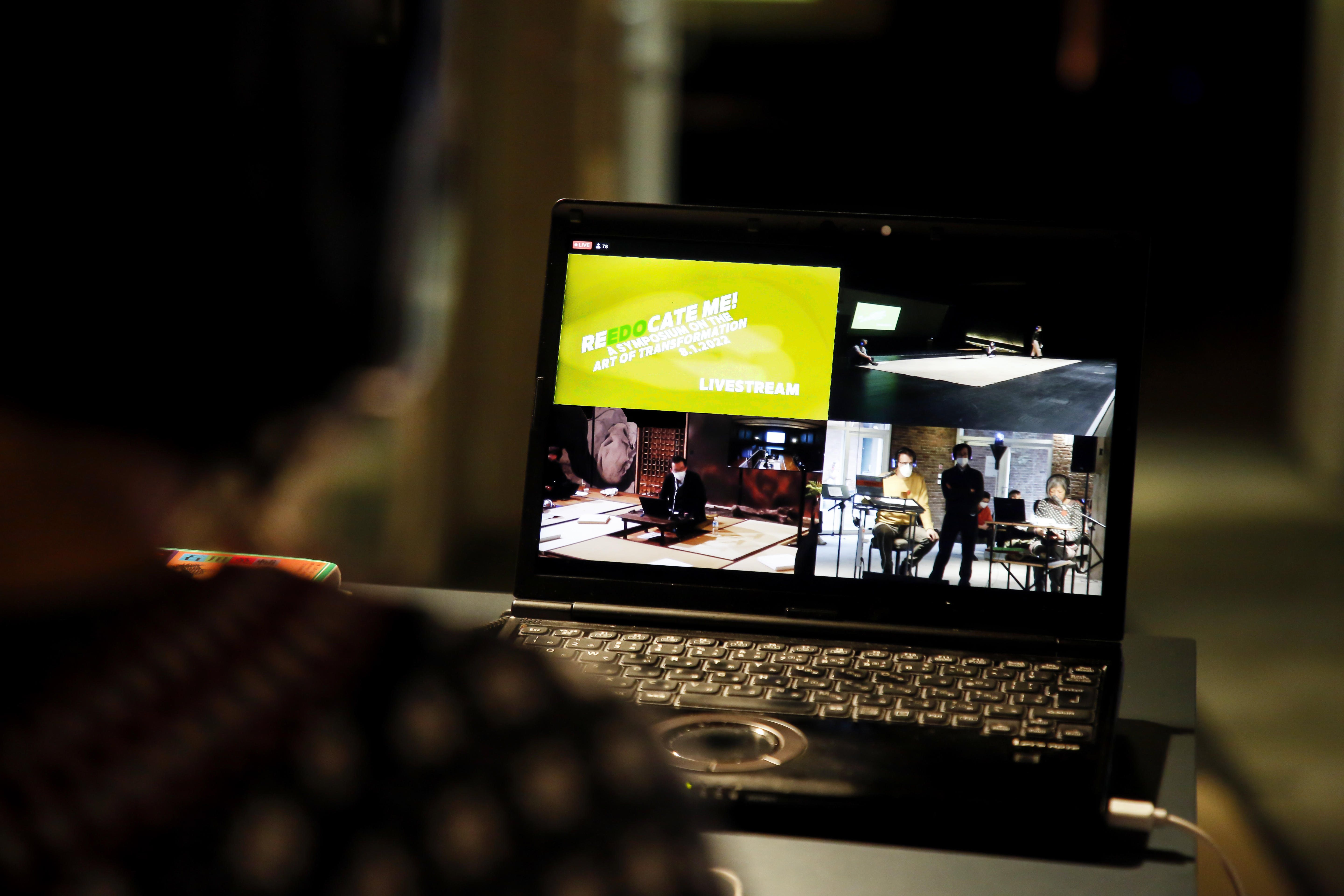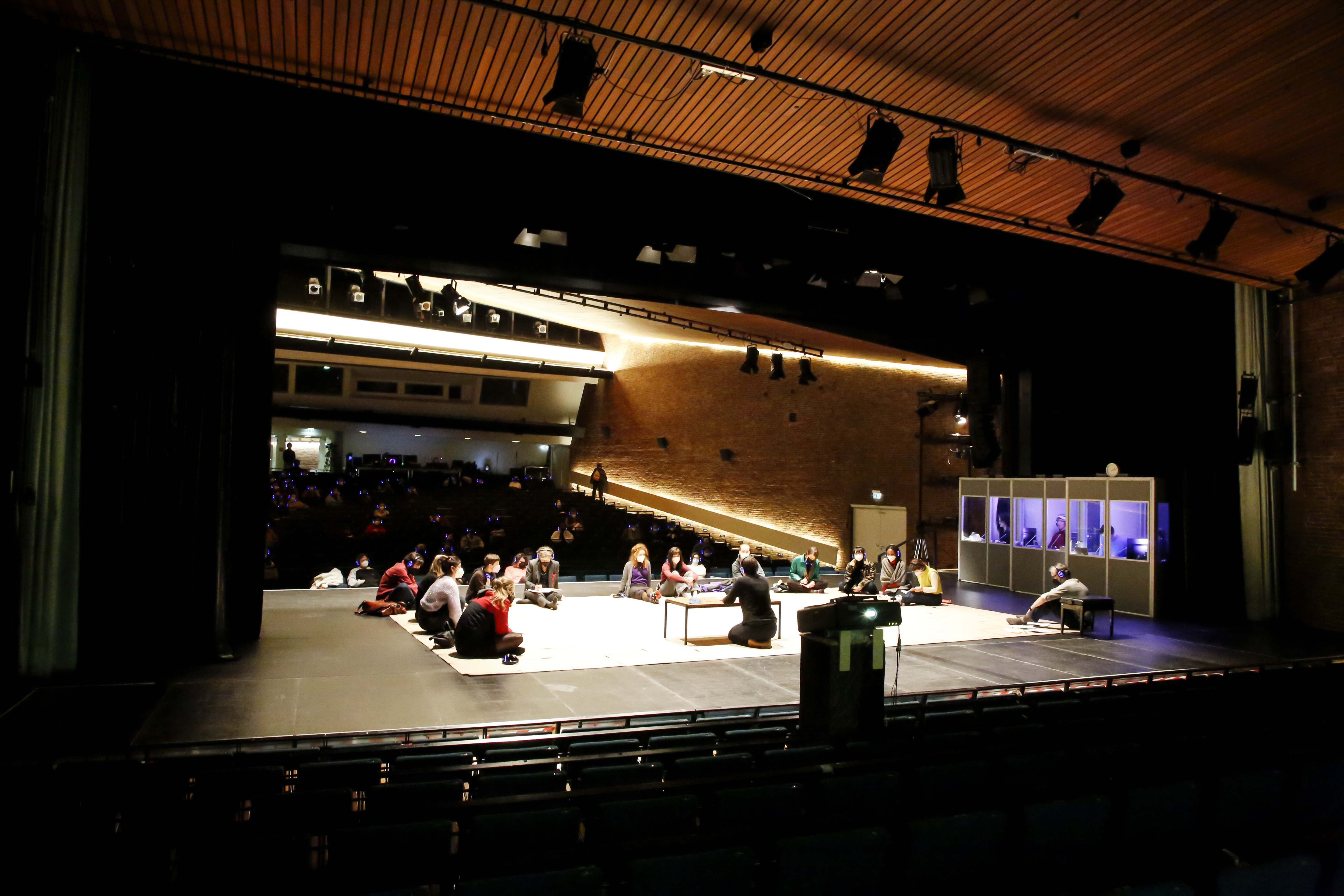A symposium on the art of transformation
A cooperation of FloatingUniversity, Akademie der Künste, KYOTO EXPERIMENT with the kind support of Hauptstadtkulturfonds Berlin and E.ON Stiftung.
︎︎︎ Home
︎︎︎ Hintergrund
// Background
︎︎︎ Künstler*innen
// Artists
︎︎︎ Camp
︎︎︎ Symposium
︎︎︎ Tickets
︎︎︎ deutsch//german
︎︎︎ 日本語//japanese
︎︎︎ englisch//english
SYMPOSIUM 8.1.22.
listen in german:
listen in english:
listen in japanese:
LISTEN BACK
0:08
Lecture Azby Brown (& talk Fritz Frenkler)
1:08
artistic intervention
1:24
Lectures Yuku Tanaka & Matthias Schmelzer
2:30
artistic intervention
2:40
Lecture Ulrike Herrmann (& talk Andres Veiel)
3:20
Lectures Daigo Kosakai & Michaela Christ
4:33
ReEDOcate Festival
Press
︎︎︎ Deutschlandfunk
Filmemacher Andres Veiel zu Japans Edo-Zeit als Inspiration für den Klimaschutz
︎︎︎ Dlf Kultur
Alternativen zur Konsumgesellschaft: Die japanische EDO-Periode als Inspiration
︎︎︎ Dlf Kultur
Von Japan lernen: Edo-Epoche und kreativer Umgang mit Ressourcenknappheit
Prologue //
reEDOcate me Symposium
on January 8, 2022
(english)
ReEDOcate ME!
A symposium on the Art of Transformation
Looking at the historical model of the Japanese Edo period, the interdisciplinary symposium ReEDOcate ME! explored spaces of thought and design for a climate-friendly future in lectures, talks, and artistic interventions that took place concurrently at the Goethe-Institut in Tokyo and Academy of Arts in Berlin. Historians, Japanologists, transformation scholars, and artists exchanged views on different aspects of the commodity crisis that occurred in Japan during the Edo period as well as the cultural innovations that developed from it. They discussed similarities and differences with current attempts at transformation towards a carbon-free economy. The symposium focused on several key questions: What caused the commodity crisis in Japan? What political measures were taken to counter it? What innovations emerged under the new conditions? Can regulatory frameworks spur innovation? What lessons can we learn from the historical example - and how can we modify them? How do we arrive at a different narrative of progress?
The symposium was organised by: Benjamin Foerster-Baldenius, Aljoscha Begrich, Christian Tschirner, Makiko Yamaguchi, Elisa Leroy, Keiko Kodaka.
Livestream timecodes:
0:08 Lecture Azby Brown (& talk Fritz Frenkler)
1:10 Artistic intervention
1:24 Lectures Yuko Tanaka & Matthias Schmelzer
2:30 Artistic intervention
2:40 Lecture Ulrike Herrmann (& talk Andres Veiel)
3:20 Lectures Daigo Kosakai & Michaela Christ
4:33 ReEDOcate Festival
![]()
![]()
![]()
![]()
![]()
![]()
![]()
![]()
![]()
![]()
![]()
![]()
![]()
![]()
![]()
The live stream of the symposium is available on the left. For the ReEDOcate ME! festival, the symposium forms a common knowledge platform.
(german)
ReEDOcate ME!
Ein Symposium zur Kunst der Transformation
Ausgehend vom historischen Modell der japanischen Edo-Zeit untersuchte das interdisziplinäre Symposium ReEDOcate ME! parallel am Goethe-Institut in Tokyo und an der AdK Berlin in Vorträgen, Gesprächen und künstlerischen Beiträgen Denk- und Gestaltungsräume für eine klimafreundliche Zukunft. Historiker*innen, Japanolog*innen, Transformationswissenschaftler*innen und Künstler*innen tauschten sich über Aspekte der Rohstoffkrise zur japanischen Edo-Zeit und daraus erwachsende kulturelle Innovationen aus. Sie diskutierten Parallelen und Unterschiede zu gegenwärtigen Ansätzen einer Transformation hin zu einer karbonfreien Wirtschaftsweise. Das Symposium konzentrierte sich auf eine Reihe von Schlüsselfragen: Wie kam es zur Rohstoffknappheit in Japan? Welche politischen Maßnahmen wurden ergriffen? Welche Innovationen entstanden unter den neuen Rahmenbedingungen? Kann ordnungspolitische Rahmensetzung Innovation beflügeln? Was ist für uns aus dem historischen Beispiel nutzbar und in welchen Modifikationen? Wie kommen wir zu einer anderen Fortschrittserzählung?
Das Symposium wurde organisiert von: Benjamin Foerster-Baldenius, Aljoscha Begrich, Christian Tschirner, Makiko Yamaguchi, Elisa Leroy, Keiko Kodaka
Timecodes des Live-Streams:
0:08 Lecture Azby Brown (& talk Fritz Frenkler)
1:10 Artistic intervention
1:24 Lectures Yuko Tanaka & Matthias Schmelzer
2:30 Artistic intervention
2:40 Lecture Ulrike Herrmann (& talk Andres Veiel)
3:20 Lectures Daigo Kosakai & Michaela Christ
4:33 ReEDOcate Festival
Der aufgezeichnete Live-Stream des Symposiums soll eine gemeinsame Wissenplattform für die weitere Arbeit bilden. Er ist auf der linken Seite abrufbar.
(japanese)
ReEDOcate ME!
変革の術をめぐるシンポジウム
日本の江戸時代をモデルにした学際的なシンポジウム「ReEDOcate ME!」は、東京のゲーテ・インスティトゥートとベルリンの芸術アカデミーにて同時開催され、レクチャー、トーク、アーティストによるライブアクトを通じて、気候にやさしい未来のための思考とデザインの可能性について探求しました。歴史学者、日本学者、トランスフォーメーション理論学者ならびにアーティストが、江戸時代の日本において資源が不足するなかで生活における革新が実現したことについて意見交換を行い、カーボンフリー経済への変革に向けた現在のアプローチとの類似点、相違点を議論しました。シンポジウムでは、日本の資源不足はなぜ起きたのか、当時どのような政策がとられ、新しい規制のもとでどのようなイノベーションが生まれたか、規制や制限のもとでイノベーションが生まれるのか、私たちは歴史的な事例から何を学び、何を変更すべきなのか、これまでとは異なる進歩のナラティブにどうやってたどり着けるのか、といった重要な問いを中心に扱いました。
このシンポジウムは、ベンヤミン・フェルスター=バルデニウス、アリョーシャ・ベグリッヒ、クリスティアン・チルナー、山口真樹子、エリザ・ルロイ、小高慶子が企画運営を担いました。
配信のタイムコード:
0:08 講演 アズビー・ブラウン(トーク:フリッツ・フレンクラー)
1:10 アーティスティック・インターベンション
1:24 講演 田中優子、マティアス・シュメルツァー
2:30 アーティスティック・インターベンション
2:40 講演 Ulrike Herrmann (トーク:アンドレス・ファイエル)
3:20 講演 小坂井大吾、ミヒャエラ・クリスト
4:33 ReEDOcateフェスティバル について
シンポジウムのライブ配信の録画は、今後の研究や創作のための共同の知のプラットフォームとなることを目的として、ここに公開しています。このサイトの左側からアクセスできます。
Participants Symposium
Azby Brown
Azby Brown is an artist, designer, architect, and author of numerous books, including "The Very Small Home" (2005), "Just Enough: Lessons in living green from traditional Japan" (2010), and "The Genius of Japanese Carpentry" (2014). He has been living in Japan since 1985 and joined the faculty of architecture at Kanazawa Institute of Technology in 1995. In 2003, he founded the Future Design Institute, which focuses on the cognitive and cultural dimension of the human hand and its use in the creative process.
アズビー・ブラウン
アーティスト、デザイナー、建築家、作家。主要な著書に、『江戸に学ぶエコ生活術』(2011)、『スモール・ホーム』(2005)、『寺社建築の秘密』(1995)。1985年より日本在住。1995年より金沢工業大学に勤務し、2003年には同大学で未来デザイン研究所 を創設、所長をつとめた。同研究所は人間の手と創造的プロセスにおけるその利用に関する認知的・文化的課題を取り上げている。
Künstler, Designer, Architekt und Autor zahlreicher Bücher, darunter „The Very Small Home“ (2005), „Just Enough: Lessons in living green from traditional Japan“ (2010), und „The Genius of Japanese Carpentry“ (2014). Er lebt seit 1985 in Japan und ist seit 1995 an der Fakultät für Architektur des Kanazawa Institute of Technology tätig. Im Jahr 2003 gründete er das Future Design Institute, das sich mit kognitiven und kulturellen Fragen rund um die menschliche Hand und ihren Einsatz im kreativen Prozess befasst.
Dr. Michaela Christ
Michaela Christ is head of Diachronic Transformation Research at the Norbert Elias Center for Transformation Design & Research at Flensburg University. Her research focuses on the sociology of culture, of violence, of social change, and on National Socialism.
ミヒャエル・クリスト
フレンスブルク大学トランスフォーメーション・デザイン&リサーチセンターの通時的トランスフォーメーションリサーチ部門チーフ。主要な研究分野は、文化社会学、暴力の社会学、社会変革の社会学およびナチズム。
Leiterin des Forschungsbereichs Diachrone Transformationsforschung am Norbert Elias Center for Transformation Design & Research an der Universität Flensburg. Ihre Forschungsschwerpunkte sind die Kultursoziologie, die Soziologie der Gewalt, die Soziologie des sozialen Wandels und der Nationalsozialismus.
Professor Fritz Frenkler
Fritz Frenkler is an industrial designer, Managing Director of f/p design GmbH, Berlin, Munich, Kyoto, as well as Emeritus of Excellence from the Technical University of Munich. He was recently named head of the department for Architecture at the Academy of the Arts Berlin.
フリッツ・フレンクラー
インダストリアル・デザイナー、f/pデザイン社代表(ベルリン・ミュンヘン・京都)、ミュンヘン工科大学名誉教授、ベルリン芸術アカデミー建築部門ディレクター。
Industriedesigner, Geschäftsführer der f/p design GmbH, Berlin, München, Kyoto, Emeritus of Excellence in der Technischen Universität München, Direktor der Sektion Baukunst an der Akademie der Künste Berlin.
Ulrike Herrmann
Journalist and author Ulrike Herrmann is an economic correspondent for the daily newspaper "taz". She has published numerous books on economics. In 2016, her book "Why no capitalism is not a solution. The crisis of today's economy - or what we can learn from Smith, Marx and Keynes" and in 2019 "Germany, an economic fairy tale. Why it's no wonder we got rich."
ウルリケ・ヘルマン
ジャーナリスト、著述家。ベルリンの新聞taz 紙経済担当。経済政策に関する著書多数。主要な著書に『Kein Kapitalismus ist auch keine Lösung. Die Krise der heutigen Ökonomie – oder was wir von Smith, Marx und Keynes lernen können (資本主義を否定しても解決にはならない。今日の経済の危機 – もしくはスミス、マルクス、ケインズから我々が学べることとは)』(2016)、『Deutschland, ein Wirtschaftswundermärchen. Warum es kein Wunder ist, dass wir reich geworden sind. (ドイツの奇跡の経済成長神話。私たちが豊かになったのが奇跡ではない理由について)』。
Journalistin und Autorin, arbeitet als Wirtschaftskorrespondentin für die Tageszeitung »taz«. Sie hat zahlreiche wirtschaftspolitische Bücher veröffentlicht. 2016 erschien ihr Buch »Kein Kapitalismus ist auch keine Lösung. Die Krise der heutigen Ökonomie – oder was wir von Smith, Marx und Keynes lernen können« und 2019 »Deutschland, ein Wirtschaftswundermärchen. Warum es kein Wunder ist, dass wir reich geworden sind.«
Dr. Daigo Kosakai
Daigo Kosakai is curator at the Edo-Tokyo Museum, with a research focus on village life in the Kanto, Kinai, Hokuriku and Shikoku regions from the second half of the 15th century to the early Edo period. He also researches urban construction history of the Edo period based on the lives of wealthy merchants. He recently curated the exhibitions "Samurai - Peacekeeping in the Edo Period" and "The Splendor of Edo - Rites of the Samurai and Festivals of the Merchants."
小酒井大悟
東京都江戸東京博物館 主任学芸員
1977年生まれ。2008年、一橋大学大学院社会学研究科博士後期課程修了、博士(社会学)号取得。2013年、江戸東京博物館学芸員、現在に至る。日本の江戸時代史、とくに関東や畿内、北陸、四国を対象に、戦国時代から江戸時代初期にかけての村のあり方や百姓の暮らしをおもな研究テーマとしている。また、近年では、江戸の都市史について、大店(豪商、富裕な商家)に注目しながら研究を進めている。江戸東京博物館の展覧会では、特別展「士サムライ―天下太平を支えた人びと―」(2019年)、「大江戸の華-武家の儀礼と商家の祭-」(2021年)などを担当。
Kurator für Sonderausstellugen am Edo-Tokyo Museums, mit einem Forschungsschwerpunkt auf das Leben in den Dörfern in den Regionen Kanto, Kinai, Hokuriku und Shikoku von der zweiten Hälfte des 15. Jh. bis in die jüngere Edo-Periode. Außerdem Stadtbaugeschichte der Edo-Zeit anhand des Lebens wohlhabender Kaufleute. Er kuratierte jüngst die Ausstellungen “Samurai – Friedenssicherung in der Edo-Zeit” und “Die Pracht von Edo - Riten der Samurai und Feste der Kaufleute”.
Dr. Matthias Schmelzer
Economic historian, networker and climate activist. He works at the Institute of Sociology at Friedrich Schiller University in Jena. His research interests include the political economy of capitalism, social and environmental history, climate disasters, and alternative economics. He is the author of the award-winning book "The Hegemony of Growth. The OECD and the Making of the Economic Growth Paradigm."
マティアス・シュメルツァー
経済史学者、ネットワーカー、気候変動アクティヴィスト。イエナ大学社会学研究所勤務。主要な研究分野は、資本主義の政治経済、社会・環境史、気候カタストロフ、オルタナティブ経済。著書『成長のヘゲモニー。OECDと経済成長パラダイムの形成』で表彰される。
Wirtschaftshistoriker, Netzwerker und Klimaaktivist. Er arbeitet am Institut für Soziologie der Friedrich-Schiller-Universität Jena. Zu seinen Forschungsschwerpunkten gehören die politische Ökonomie des Kapitalismus, Sozial- und Umweltgeschichte, Klimakatastrophen und alternative Ökonomie. Er ist Autor des preisgekrönten Buches "The Hegemony of Growth. The OECD and the Making of the Economic Growth Paradigm".
Professorin Yuko Tanaka
Former President of Hosei University, Tokyo, Yuko Tanaka is Professor Emeritus and Professor at the Edo-Tokyo Research Center. She has authored numerous and award-winning books on the Edo period. Her academic specialties are early modern Japanese culture and comparative Asian culture. Prof. Tanaka regularly comments on current issues in the Japanese media regarding the values, perspectives, and sustainability of the Edo period.
田中優子
法政大学前総長。名誉教授、江戸東京研究センター特任教授
法政大学社会学部教授、国際日本学インスティテュート(大学院)運営委員長、社会学部長、総長を歴任。専門は日本近世文化・アジア比較文化。研究領域は、江戸時代の文学、美術、生活文化。『江戸の想像力』で芸術選奨文部大臣新人賞、『江戸百夢』で芸術選奨文部科学大臣賞・サントリー学芸賞。その他多数の著書がある。江戸時代の価値観、視点、持続可能社会のシステムから、現代の問題に言及することも多い。2005年度紫綬褒章。近著に『カムイ伝講義』『布のちから』『江戸から見ると』『苦海・浄土・日本』『江戸問答』など。サントリー芸術財団理事、『週刊金曜日』編集委員、TBS「サンデーモーニング」のコメンテーターもつとめる。
Ehemalige Präsidentin der Hosei Universität, Tokyo, Professorin Emeritus, Professorin am Edo-Tokyo Research Center, Autorin zahlreicher und preisgekrönter Bücher über die Edo-Zeit. Ihre akademischen Spezialgebiete sind die früh-moderne japanische Kultur und vergleichende asiatische Kultur. Regelmäßig kommentiert Prof. Tanaka in den japanischen Medien aktuelle Probleme im Hinblick auf die Wertvorstellungen, Perspektiven und die Nachhaltigkeit der Edo- Zeit.
Andres Veiel
Andres Veiel is a film and theater director as well as author. His works often address the connections between biographical and historical violence and move in between fiction and reality. Veiel is considered one of the most prominent representatives of politically engaged art.
アンドレス・ファイエル
映画監督、演出家、作家。その作品は個人史と歴史における暴力の関連性を主題とし、フィクションとリアリティの狭間を行き来する。政治にコミットする芸術の最も重要な担い手のひとり。
Film- und Theaterregisseur, Autor. Seine Arbeiten thematisieren oft die Zusammenhänge von biografischer und historischer Gewalt und bewegen sich im Grenzbereich von Fiktion und Realität. Veiel gilt als einer der profiliertesten Vertreter einer politisch engagierten Kunst.
With:
Nicholas Bussmann
Azby Brown
Michaela Christ
Toshikatsu Ienari (dot architects)
eat&art taro
Fritz Frenkler
Ulrike Herrmann
Daigo Kosakai
Sampo Inc
Matthias Schmelzer
Yuko Tanaka
Bastian Reiber
Andres Veiel
Nagara Wada
and others
in asscoaition with/funded by
︎︎︎ FloatingUniversity
︎︎︎ Akademie der Künste
︎︎︎ Goethe-Institut Tokyo
︎︎︎ Japan Foundation
︎︎︎ Hauptstadtkulturfonds
Interpreters
Team English:
Lilian Astrid Geese
Catherine Johnson
Gyda Thurow
Team Japanese:
Mai Rapsch
Makoto Takeda
Toshi Winschermann
